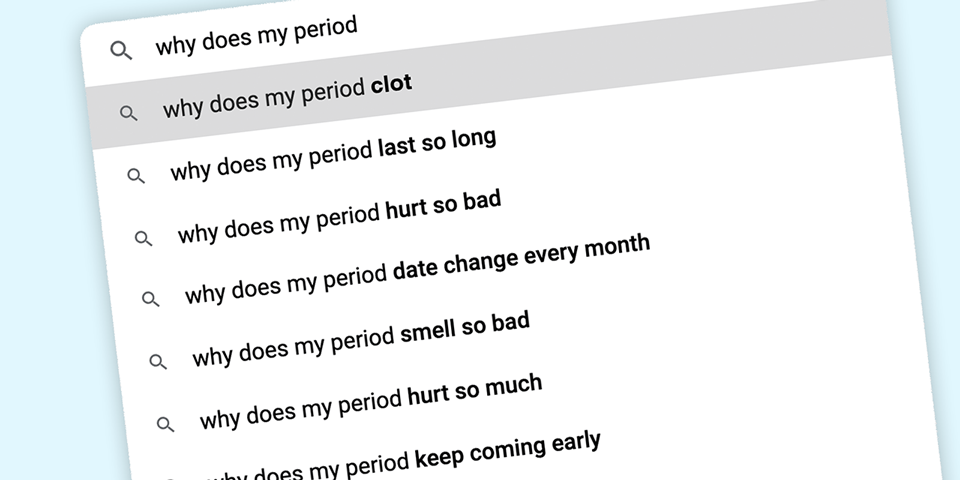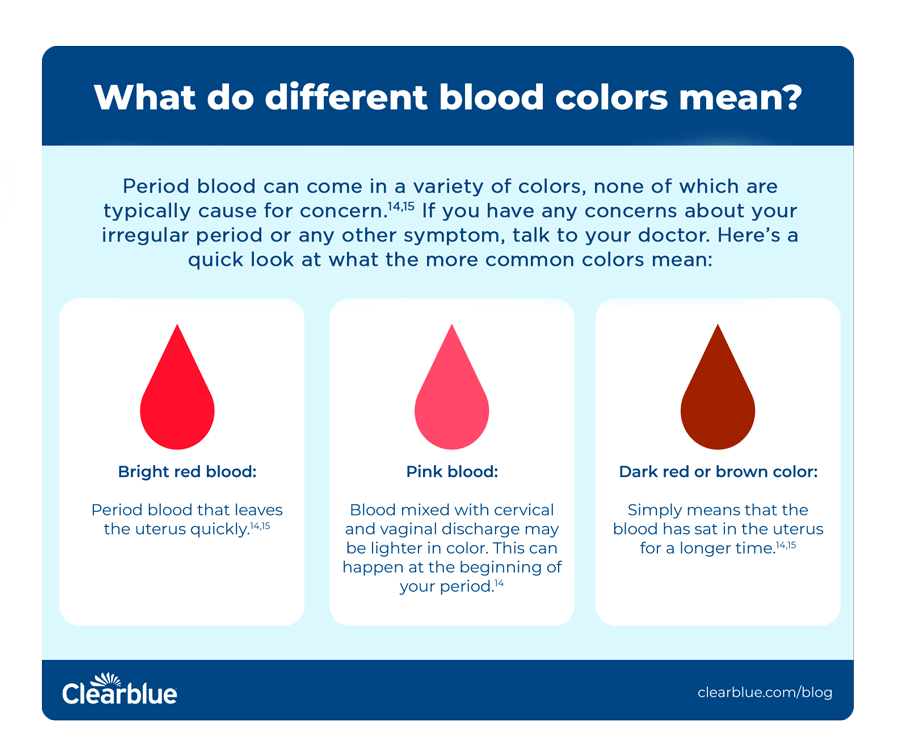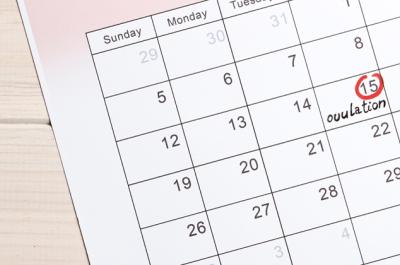7 questions about your period you’ve always wondered about

When was your first period talk? Maybe it was with your mom, or in a girls-only presentation in grade school. Or maybe it was during high school health class, with its complex diagrams and textbook terminology. Chances are, you learned the basics about your period back then, but not what you really want to know now. And what you really want to know, you may be too embarrassed to ask.
Rest assured, you’re not the only woman who has searched for this info online, and you certainly won’t be the last. Here we answer seven (perfectly normal) questions about your period that probably didn’t come up in that first talk.
Why does my period smell so bad?
You may wonder why your period smells different than other blood. People use the word “blood” to describe a period, but it’s not just blood. Menstrual blood is composed of blood, vaginal fluids and the cells and fluids that make up the lining of the uterus your body sheds every month.1 These factors may cause your period to have a distinct odor.
However, if you notice a foul or unpleasant odor during your period, don’t ignore it. Bacteria naturally exist in your vagina, but it is generally known that an overgrowth of bacteria can lead to difficulties, such as bacterial vaginitis.2 If you have any concerns, talk to your healthcare provider. The No. 1 symptom is a strong, fishy odor.2 Other symptoms include burning in the vagina or while peeing; pain around the vagina; itching in or around the vagina; and thin white or gray vaginal discharge.3
Good hygiene is also important. Change your pads and tampons frequently, and wear clean, breathable underwear. According to the Office on Women’s Health, one in five women ages 15 to 44 douche, which means they wash or clean out their vagina with water or a mixture of cleaners.4 Doctors do not recommend this. Douching has been linked to vaginal infections and issues with conceiving.4
Why are period poops a thing?
Gastrointestinal (GI) issues immediately prior to and during menstruation are very common and can include abdominal pain, diarrhea, constipation and bloating.5 Some women also experience nausea, pelvic pain and vomiting.5
Period pain in the form of cramping, before or during your period, is caused by prostaglandins, chemicals made in the lining of your uterus.6 According to the American College of Obstetricians and Gynecologists, prostaglandins cause the muscles and blood vessels of your uterus to contract, more so on the first day of your period and less so as your period progresses.6 Some experts believe that prostaglandins also cause increased GI issues, too, including diarrhea.
Some women experience constipation leading up to their period, and then diarrhea once their period starts. Studies show progesterone and estrogen can cause constipation (a common issue in pregnancy).7 If pregnancy doesn’t occur, these hormones drop, triggering menstruation, and prostaglandins spike, causing diarrhea.7
Why is my period so heavy?
Heavy menstrual bleeding is defined as bleeding that lasts more than seven days and/or is unusually heavy in volume.8 You can judge your volume by how often you have to change your tampon or pad. If you regularly need to change it every hour for several hours in a row, have to change pads or tampons during the night, or if you pass clots the size of a quarter or bigger, your period is heavier than normal.9
You’re not alone. One in five women experiences heavy periods every year.10 Possible causes include uterine fibroids or polyps, certain types of birth control, bleeding-related disorders, thyroid disease, pelvic inflammatory disease, liver disease, kidney disease or in rare cases, cancer.10 Certain medications can cause heavy periods, too. If you’re experiencing heavy menstrual bleeding, talk to your doctor. Depending on the cause, many treatment options exist.10
Why is my period so light?
On average, a woman loses two to three tablespoons of blood per period.11 If you typically lose about that much and you start losing less, or if you are only spotting, you may be experiencing light periods.
One of the first things to consider is your age. Women usually begin to experience perimenopause bleeding in their mid-40s.12 As your ovaries begin to produce less estrogen, your periods begin to change — they may lighten and you may begin to skip periods.12
Primary ovarian insufficiency (POI), which is when your ovaries stop working properly before the age of 40, can also cause lighter periods (and make pregnancy difficult).13
If you experience a missed period or you’re only spotting, it’s important to test for pregnancy. Be sure to talk to your doctor if you experience symptoms of an irregular period.
What does different color period blood mean?
Period blood can come in a variety of colors, none of which are typically cause for concern.14 ,15 If you have any concerns about your irregular period or any other symptom, talk to your doctor. Here’s a quick look at what the more common colors mean:
- Bright red blood: Period blood that leaves the uterus quickly is often bright red in color.14 ,15
- Pink blood: Bright red blood that mixes with cervical and vaginal discharge may be lighter in color. This often happens at the beginning of your period.14
- Dark red or brown blood: A dark red or brown color simply means the blood has sat in the uterus for a longer time.14,15

What are the large clots I see in the first few days of my period?
Most women experience blood clots during the heaviest days of their period, usually near the beginning.16 Because your period is made of blood, vaginal fluids and tissue from the lining of your uterus, menstrual blood coming out as clots, clumps or a jelly-like substance is normal. 17 Talk to your healthcare provider if you regularly see blood clots the size of, or larger than, the size of a quarter — that’s considered heavier-than-normal bleeding and should be checked out.9
Do period panties really work?
Period underwear is a personal preference. They work by absorbing menstrual blood and trapping it, keeping it from leaking onto your clothes. They can absorb three to five regular tampons’ worth of blood, or up to 12 teaspoons, depending on the brand. Many have technology to control odor.
To wash period panties, simply run them under cold water until the water runs clear. You can then wash most brands with a regular load of laundry, often on a delicate cycle, and hang to dry. With proper care, period underwear can last anywhere from six months to two years.
For some women, period panties can take a little while to get used to, simply because you can feel the flow of blood. Different brands offer different panty styles with varying levels of absorbency. Just like with tampons and pads, you have to match your underwear to your level of flow on a given day. Some women like to pair a tampon or menstrual cup with their period panties on their heavier flow days. They make period swimwear now, too!
Finally, never be shy to talk to your healthcare provider about anything you may be experiencing with your body. Remember: You are the biggest advocate for yourself and your reproductive health. Also, remember that doctors do this work for a living. Any question you ask won’t faze them — they’ve been asked before.
Sources
- Yang, H., Zhou, B., Prinz, M., & Siegel, D, (July 20, 2012), “Proteomic analysis of menstrual blood,” Molecular & Cellular Proteomics: MCP, 11(10), 1024–1035, https://linkinghub.elsevier.com/retrieve/pii/S1535947620310616.
- “Vaginitis,” (March 2020), The American College of Obstetricians and Gynecologists, https://www.acog.org/womens-health/faqs/vaginitis.
- “Bacterial Vaginosis – CDC Fact Sheet,” (July 21, 2021), Division of STD Prevention, National Center for HIV, Viral Hepatitis, STD, and TB Prevention, Centers for Disease Control and Prevention, https://www.cdc.gov/std/bv/stdfact-bacterial-vaginosis.htm.
- “Douching,” (April 1, 2019), Office on Women’s Health, U.S. Department of Health & Human Services, https://www.womenshealth.gov/a-z-topics/douching.
- “Dsymenorrhea: Painful Periods,” (December 2020), The American College of Obstetricians and Gynecologists, https://www.acog.org/womens-health/faqs/dysmenorrhea-painful-periods.
- Bharadwaj, S., Barber, M.D., Graff, L.A., Shen, B., (August 2015), “Symptomatology of irritable bowel syndrome and inflammatory bowel disease during the menstrual cycle,” Gastroenterology Report, 3(3), 185–193, https://doi.org/10.1093/gastro/gov010.
- Judkins, T.C., Dennis-Wall, J.C., Sims, S.M., Colee, J., & Langkamp-Henken, B., (June 29, 2020), “Stool frequency and form and gastrointestinal symptoms differ by day of the menstrual cycle in healthy adult women taking oral contraceptives: a prospective observational study,” BMC Women’s Health, 20(1), 136, https://bmcwomenshealth.biomedcentral.com/articles/10.1186/s12905-020-01000-x.
- “Heavy and Abnormal Periods,” (October 2020), The American College of Obstetricians and Gynecologists, https://www.acog.org/womens-health/faqs/heavy-and-abnormal-periods.
- “Heavy Menstrual Bleeding,” (May 2021), The American College of Obstetricians and Gynecologists, https://www.acog.org/womens-health/faqs/heavy-menstrual-bleeding.
- “Heavy Menstrual Bleeding,” (December 20, 2017), Bleeding Disorders in Women, Centers for Disease Control and Prevention, https://www.cdc.gov/ncbddd/blooddisorders/women/menorrhagia.html.
- “Your menstrual cycle,” (March 16, 2018), Office on Women’s Health, U.S. Department of Health & Human Services, https://www.womenshealth.gov/menstrual-cycle/your-menstrual-cycle.
- “Perimenopausal Bleeding and Bleeding After Menopause,” (October 2020), The American College of Obstetricians and Gynecologists, https://www.acog.org/womens-health/faqs/perimenopausal-bleeding-and-bleeding-after-menopause.
- “Primary Ovarian Insufficiency (POI),” (December 1, 2016), Eunice Kennedy Shriver National Institute of Child Health and Human Development, U.S. Department of Health and Human Services, National Institutes of Health, https://www.nichd.nih.gov/health/topics/poi.
- “What Does the Color of Your Period Mean?” (September 28, 2020), Women’s Health, Cleveland Clinic, https://health.clevelandclinic.org/what-does-the-color-of-your-period-mean/.
- “Is Period Blood Always Red?” (November 2018), TeensHealth, Nemours, https://kidshealth.org/en/teens/blood-color.html.
- “Period Blood Clots: Are They Normal?” (September 20, 2021), Women’s Health, Cleveland Clinic, https://health.clevelandclinic.org/period-blood-clots-are-they-normal/.
- “Bleeding disorders,” (December 27, 2018), Office on Women’s Health, U.S. Department of Health & Human Services, https://www.womenshealth.gov/a-z-topics/bleeding-disorders.




